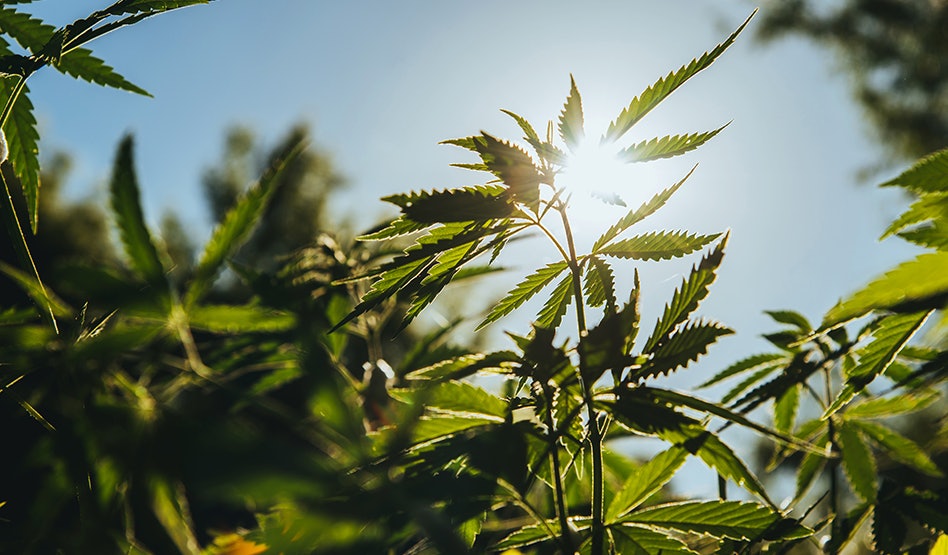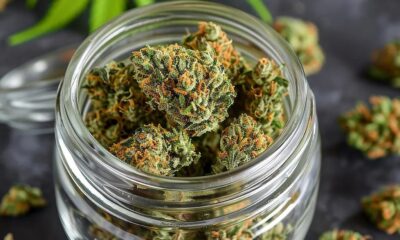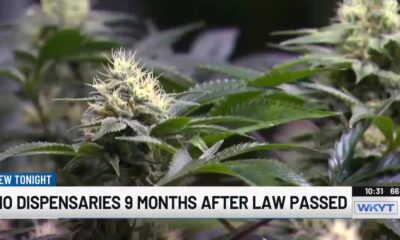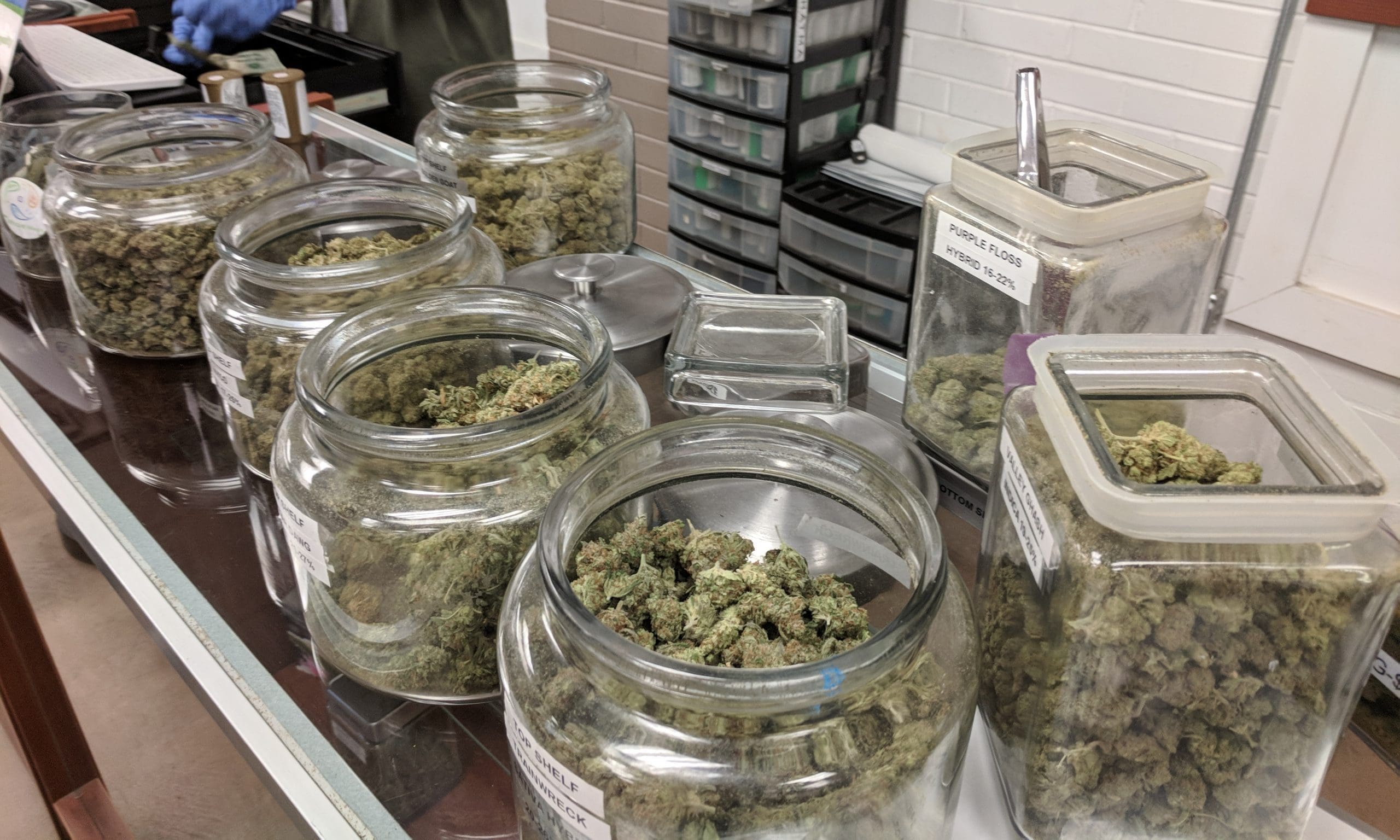featured
CRS Provides 4 Considerations for Congress to Revise 2018 Farm Bill’s Hemp Definition
Published
4 weeks agoon

The Congressional Research Service (CRS) issued a report on Aug. 20 that dives into federal interpretations of hemp, legal challenges to state laws restricting THC products and considerations for Congress related to the 2018 Farm Bill.
The report, authored by Legislative Attorney Dorothy Kafka, comes as federal and state lawmakers continue to wrangle over an intoxicating hemp product marketplace that mushroomed throughout the nation following Congress federally legalizing hemp beyond state pilot programs nearly seven years ago.
Since the 2018 Farm Bill, more than a dozen states have enacted legislation to fully prohibit intoxicating hemp products, while other states have banned synthetically derived cannabinoids or specific types of products. Meanwhile, some states regulate the products as cannabis or consumer goods, and others have allowed the products to remain available with no regulations.
Under federal law, “cannabis” is categorized into hemp (below 0.3% delta-9 THC on a dry-weight basis) and marijuana (above 0.3% THC), Kafka explained in the CRS report. However, the patchwork of state laws has unfolded without a clear direction from the federal government.
“Some of these laws—such as those in Virginia and Arkansas—prohibit certain activities involving certain cannabis products by including them in their state controlled substances laws,” she wrote. “Various parties within the cannabis industry have challenged some of these states’ laws on the ground that (1) the 2018 Farm Bill preempts these laws, and (2) the state laws violate the dormant Commerce Clause.”
Legal Challenges to State Laws
Related to the preemption argument, the 2018 Farm Bill specifically prevents states from regulating the transportation or shipment of hemp “through” their boundaries (interstate commerce) but does not stop states from regulating intrastate hemp commerce. Also, nothing in the federal legislation limits states from adopting laws to regulate hemp more stringently (just not less stringently) than the 2018 Farm Bill.
The U.S. Court of Appeals for the Eighth Circuit issued an opinion in June 2025 confirming this, dealing a victory to Arkansas state officials who have been attempting to implement a ban on certain hemp-derived cannabinoids for the past two years via the passage of Act 629.
Specifically, the plaintiffs in that case argued that Congress had intended to “federally protect hemp” in the 2018 Farm Bill.
“The Eighth Circuit rejected this argument, determining instead that the text and structure of the 2018 Farm Bill shows that Congress wanted only to ‘facilitate state legalization of hemp, if a state wants to,’ and to ‘ensure other states do not become a hurdle to an in-state hemp industry,’” Kafka wrote. “The court explained: “[J]ust because states may legalize hemp under the 2018 Farm Bill does not mean they must.”
Under the dormant Commerce Clause, the federal government prevents states from passing laws that inhibit interstate commerce or that provide in-state protectionist measures that impede a national market for goods and services.
When Virginia passed Senate Bill 903, which became effective in July 2023, the commonwealth redefined hemp products and industrial hemp extracts as goods containing no more than 0.3% in total THC, which factors in THCA and any other form of THC, such as delta-8.
In a lawsuit that included two hemp businesses and one state resident, the plaintiffs argued that S.B. 903 would discriminate against out-of-state buyers by preventing them from accessing Virginia hemp.
The U.S. Court of Appeals for the Fourth Circuit issued an opinion in January 2025 that Virginia’s law did not discriminate against out-of-state interests because it applied to in-state and out-of-state buyers alike.
“The court further held that the law does not unjustifiably burden interstate commerce, and therefore it affirmed the district court’s determination that the plaintiffs failed to establish a likelihood of success on their dormant Commerce Clause claim,” Kafka wrote in this week’s CRS report.
Federal Interpretations
In addition to the legal challenges to state laws, Kafka outlined how a pair of circuit rulings collide with the Drug Enforcement Administration’s (DEA) interpretation of the 2018 Farm Bill’s definition of hemp, before she presented four key considerations for Congress.
Specifically, the DEA determined in August 2020 that “all synthetically derived tetrahydrocannabinols,” such as delta-8 THC and THC-O, remain Schedule I federally controlled substances, according to the agency’s interim final rule.
Roughly a year later, Terrence L. Boos, Ph.D., chief of the Drug and Chemical Evaluation Section of the DEA’s Diversion Control Division, authored an opinion letter to the Alabama Board of Pharmacy stating that the DEA believes delta-8 THC synthetically produced from non-cannabis materials is a controlled substance under federal law.
Although intoxicating delta-8 THC is naturally occurring in cannabis, it is often converted in a lab from nonintoxicating CBD.
The U.S. Court of Appeals for the Ninth Circuit issued an opinion in May 2022 colliding with the DEA’s interpretation, when a federal judge applied the DEA’s argument to delta-8 THC in a trademark infringement and copyright dispute between AK Futures LLC and Boyd Street Distro LLC in Nevada. The judge ruled that delta-8 THC is legal under the 2018 Farm Bill.
“The Ninth Circuit affirmed, holding that the plaintiff’s delta-8 THC products fit within the statutory definition of hemp because the plaintiff’s uncontradicted evidence indicated that the products were ‘hemp-derived’ and contained ‘less than 0.3% of delta-9 THC,’” Kafka wrote in the CRS report. “The court held that the 2018 Farm Bill definition did not depend on the manner in which derivatives, extracts and cannabinoids were produced.”
In February 2023, Boos also declared that THC-O was a Schedule I controlled substance in a letter to international cannabis lawyer Rod Kight, a determination Boos said was made on the fact that THC-O does not occur naturally in the cannabis plant—it’s a semi-synthetic analogue derived from THC.
However, the U.S. Court of Appeals for the Fourth Circuit issued an opinion in September 2024 that THC-O meets the legal definition of hemp under the 2018 Farm Bill, again veering from Boos’ interpretation. The appellate case stemmed from a North Carolina resident, Tonya Anderson, getting fired from her job with Diamondback Investment Group LLC for failing two drug tests. Anderson argued she consumed legal hemp products, but Diamondback referenced the DEA’s 2023 opinion letter and argued THC-O was not legal.
“The Fourth Circuit rejected the defendant’s argument and instead agreed with the Ninth Circuit in AK Futures that the 2018 Farm Bill definition unambiguously establishes that ‘hemp’ includes ‘all’ cannabinoids, and derivatives and extracts of cannabis, so long as they do not cross the 0.3% delta-9 THC threshold,” Kafka wrote. “According to the court, whether a substance is considered hemp does not depend on how it was manufactured but rather whether it comes from cannabis.
“The court also noted that, in light of the U.S. Supreme Court’s decision in Loper Bright v. Raimondo overturning the Chevron doctrine, the court would not need to defer to DEA’s interpretation even if the court had determined that the statutory definition was ambiguous [in the 2018 Farm Bill].”
The court determined that the definition of hemp was unambiguous.
Considerations for Congress
In light of the federal interpretations and legal challenges to state laws leading to uncertainty and disagreement over the 2018 Farm Bill’s definition of hemp, Kafka offered four considerations for Congress moving forward.
1.) Should Congress revise its definition of hemp and clarify which cannabinoid products are excluded from the definition of marijuana under the Controlled Substances Act (CSA)?
In July, Kentucky U.S. Sens. Rand Paul and Mitch McConnell, both Republicans, squared off on this question, disagreeing over a path forward for consumable hemp products.
Specifically, McConnell wanted to attach language to an agricultural spending bill that would have made hemp-derived products containing synthetic compounds and/or quantifiable amounts of THC or THCA—or other cannabinoids that have similar effects on humans or animals—illegal. But Paul prevailed in removing that attachment.
Similar proposals were offered last Congress as lawmakers attempted—but ultimately delayed—to pass a farm bill reauthorization package that included an amendment to redefine hemp.
“Such an amendment would consider all THC for the purposes of legally determining what is hemp and what is marijuana,” Kafka wrote. “This change would bring certain THC products back under the CSA and DEA regulation that are currently considered to be hemp or are in an uncertain area of regulation.”
2.) Should Congress consider other amendments to the definition of hemp to adopt the DEA’s interpretation that “synthetically derived” THC remains a Schedule I controlled substance?
“Using the term ‘synthetically derived’ may raise new questions as to what Congress means by synthetic, unless it were clearly defined,” Kafka wrote. “How it would be defined would affect which products would be regulated by the CSA. Congress could also allow agency and judicial interpretations to play out without congressional intervention.”
3.) Should Congress consider amending the express preemption provision to clarify which state laws are preempted?
This question comes as legal challenges to New Jersey law and Wyoming law related to restrictions for certain THC products remain pending in the U.S. Courts of Appeals for the Third and Tenth circuits, Kafka pointed out.
“To the extent Congress seeks to allow states to ban certain hemp products entirely, Congress could clarify that states may regulate the possession, use or sale of hemp more stringently than the farm bill does; currently, the savings clause provision refers only to the production of hemp,” she wrote. “To the extent Congress would prefer to limit the states’ power to ban these substances, Congress could clarify the laws it seeks to preempt.”
4.) Should Congress consider marijuana’s status under the CSA, which would affect how cannabinoid products that are not deemed to be hemp would be regulated?
Both Congress and the executive branch, through the Department of Justice/DEA, have the authority to schedule, reschedule or deschedule substances under the CSA.
“DEA is currently considering whether to reschedule marijuana from Schedule I to Schedule III via formal rulemaking,” Kafka wrote. “Legislation was introduced in the 118th Congress that would have removed marijuana from regulation under the CSA.”

Author: mscannabiz.com
MScannaBIZ for all you Mississippi Cannabis News and Information.
You may like
-


Watertown could create new rules for cannabis shops
-


Rhode Island Opens Applications for 24 Adult-Use Dispensary Licenses
-


Kentucky still waiting on medical marijuana dispensaries 9 months after law passed
-


Can LSD Battle Anxiety? The Answer Is Yes, According to Science
-


Six hurt in shooting at marijuana event in SF's Bayview
-


Kentucky Medical Marijuana Dispensaries Should Be Stocked With Products Ready For Sale By Next Month, Top State Official Says
featured
Rhode Island Opens Applications for 24 Adult-Use Dispensary Licenses
Published
29 minutes agoon
September 15, 2025
[PRESS RELEASE] – WARWICK, R.I., Sept. 12, 2025 – The Cannabis Control Commission (CCC) opened the application period for adult-use cannabis retail licenses, marking the beginning of the largest expansion to Rhode Island’s cannabis industry. The commission is authorized under the Rhode Island Cannabis Act to license up to 24 retail establishments statewide, divided equally across six geographic zones, making this announcement a defining moment in shaping the state’s cannabis marketplace.
“Today’s announcement represents years of work, collaboration and preparation to ensure Rhode Island has a cannabis marketplace that is safe, transparent, and equitable,” CCC Chairperson Kim Ahern said. “The release of this application and launch of our submission portal is not only about opening doors for businesses but about creating meaningful opportunities for Rhode Islanders while keeping public health and public safety at the center of everything we do.”
With only 24 retail licenses available statewide, the launch of the application process is expected to draw significant interest from prospective applicants. Together with the Social Equity Applicant Status Certification Portal, which opened in August, the application process reflects the CCC’s deliberate steps toward building a cannabis industry that prioritizes economic opportunity, equity and fairness in Rhode Island.
“Rhode Island’s cannabis market is poised for growth, and this application is helping us do exactly that,” Gov. Dan McKee said. “As we expand the cannabis industry here in the Ocean State, we’re opening the doors to new investment, new good-paying jobs, and new opportunities for our economy.”
Adult-use retail licenses will authorize sales of cannabis products to adults 21 and older. By releasing the application and opening the submission portal simultaneously, the commission is providing applicants with a transparent process while reinforcing its commitment to accountability and access.
“Today’s release of the adult-use retail license application reflects the commission’s commitment to equity and accountability,” Commissioner Layi Oduyingbo said. “This framework provides applicants with the information they need while reinforcing our responsibility to safeguard public health and consumer safety.”
Commissioner Robert Jacquard said, “The commission aims to make this application process as business-friendly as possible, while upholding standards that will protect public health.”
To ensure the process is fair and accessible, the commission and Cannabis Office will provide technical assistance resources and ongoing guidance for prospective applicants. Applications will be accepted until 4 p.m. on Dec. 29, 2025.
“This is a milestone that reflects the dedication and perseverance of so many people,” Cannabis Office Administrator Michelle Reddish said. “From lawmakers and advocates to community members and our dedicated staff, countless individuals have helped build the foundation for this moment. By publishing the application today, we are taking a historic step toward building a cannabis marketplace that serves consumers, supports equity and advances public health in Rhode Island.”
The adult-use retail license application is available on the commission’s website at www.ccc.ri.gov/auapp.

Author: mscannabiz.com
MScannaBIZ for all you Mississippi Cannabis News and Information.
featured
Can LSD Battle Anxiety? The Answer Is Yes, According to Science
Published
1 hour agoon
September 15, 2025
Hands down, one of the drugs that has received the worst press in the decades marked by the War on Drugs has been LSD. All sorts of things have been said about this molecule: that it drives you crazy, or suicidal, that it remains stored in your body forever, that it irreparably damages the brain… Fortunately, we now have professionals investigating the matter, with a scientific perspective rather than a moralistic or prohibitionist one.
One of the latest findings on the subject seems to directly contradict one of the great myths about LSD: instead of leading to insanity, this compound could reduce anxiety. This is according to a study by Mind Medicine (MindMed) Inc., a biopharmaceutical company that has been researching psychedelic compounds for mental health for many years. While the preliminary results were released in 2022, they were officially published this month in the Journal of the American Medical Association.
This isn’t the first time MindMed has embarked on studying this topic: it had already achieved positive results with LSD for anxiety on another occasion. In fact, the FDA granted Breakthrough Therapy designation for generalized anxiety disorder (GAD) to the company’s proprietary drug candidate, MM120, a pharmacologically optimized formulation of LSD.
LSD and Anxiety: What the MindMed Study Says
The company conducted a multicenter, randomized, double-blind, placebo-controlled Phase 2b study at 22 outpatient psychiatric research centers in the US. The effects of a single dose of MM120 (lysergide D-tartrate, LSD) were analyzed in 198 adults with moderate to severe generalized anxiety disorder (GAD). Participants experienced sustained improvements in their condition over the 12-week observation period.
According to the company’s press release, this is the first randomized, placebo-controlled trial evaluating a single treatment at four dose levels (25, 50, 100, or 200 µg), without any psychotherapeutic intervention.
The optimal dose of MM120 was determined at 100 µg. This demonstrated a “clinically and statistically significant improvement vs. placebo, and a 65% clinical response rate and 48% clinical remission rate” at the end of the experiment.
Likewise, tolerance to the medication was positive, with the expected adverse effects of an LSD experience remaining mild to moderate and lasting only one day.
During the study, participants receiving medication for their condition had to discontinue such treatment under the supervision of the study professionals. Furthermore, on the day of dosing, they were offered “standardized music and eyeshades and could lie down, move freely around the room, read, write, or draw.” It should be noted that the study protocol explicitly prohibited participation in psychotherapy.
Dr. Maurizio Fava, one of the study’s authors, stated that “this study is a true turning point in the field of psychiatry… For the first time, LSD has been studied with modern scientific rigor, and the results are both clinically meaningful and potentially paradigm-shifting for the treatment of GAD. GAD affects 26 million adults in the U.S., yet no new medications have been approved since 2007—and first-line treatments fail 50% of patients.”
Thus, scientific innovation continues to advance against the willful ignorance of prohibitionists, working tirelessly to ensure patients have access to the relief that traditional therapies fail to provide.
This article was first published on El Planteo.

Author: mscannabiz.com
MScannaBIZ for all you Mississippi Cannabis News and Information.
featured
Kentucky Medical Marijuana Dispensaries Should Be Stocked With Products Ready For Sale By Next Month, Top State Official Says
Published
3 hours agoon
September 15, 2025
Kentucky’s top medical marijuana regulator said he expects that dispensary shelves will be stocked with products ready for sale to patients by next month.
Two of the state’s 16 medical cannabis cultivators are now operational, according to Cannon Armstrong, executive director of Kentucky’s Office of Medical Cannabis (OMC).
“If everything goes according to plan for them, I think that they’ll have medical cannabis that will be ready to harvest and be put on the shelf, you know, by October,” he told Spectrum News 1. “So we’re moving and we’re finally getting to a point where we’re, these patients are going to receive this medication sooner than later.”
Armstrong predicted that the first sales will likely occur at a dispensary in Beaver Dam called The Post.
“I think you’re going to see the first products out there based upon just how it’s shaken out,” he said. “You know, someone may step up their timeline and may get out there before that or get product from there and place it somewhere else in the state.”
As of now, OMC has approved more than 19,000 patients certifications, Armstrong said.
He added that medical cannabis supplies should be relatively scarce as the market first launches, and said that as a result initial prices will be higher than they eventually will be.
Earlier this month, Gov. Andy Beshear (D) said he thought medical marijuana would be available to Kentucky patients by the end of 2025.
“The medical marijuana program is moving forward,” he said at a press briefing at the time.
“I think most of our dispensaries now have their home address [and] are set about where they’re going to be, but [for] some of the inspections that have to happen in dispensaries, they have to have product that’s there,” he said. “So I do believe they’ll be operating before the end of the year.”
Those comments came roughly a month after the governor announced that the state’s first medical cannabis dispensary has officially been approved for operations, calling it “another step forward as we work to ensure Kentuckians with serious medical conditions have access to the medicine they need and deserve.
He previously touted an earlier “milestone” in the state’s forthcoming medical marijuana program, with a licensed cultivator producing “the first medical cannabis inventory in Kentucky history.”
Beshear’s office has said that other cannabis licensees, including processors and testing labs, are expected to become operational soon.
In July, Beshear sent a letter to President Donald Trump, urging him to reject congressional spending bill provisions that would prevent the Justice Department from rescheduling marijuana.
In the letter to the president, he emphasized that a pending proposal to move cannabis from Schedule I to Schedule III under the Controlled Substances Act (CSA) is something “you supported in your presidential campaign.”
“That process should be allowed to play out. Americans deserve leadership that won’t move the goalposts on them in the middle of the game,” Beshear said, noting that he was among the tens of thousands who submitted public comments in favor of the reform after it was initiated under the Biden administration, “demonstrating broad public interest in rescheduling.”
“I joined that effort because this is about helping people. Rescheduling would provide suffering patients the relief they need,” the governor said. “It would ensure communities are safer—because legal medical products reduce the illicit market. It would provide new, meaningful research on health benefits.”
Beshear also mentioned a letter to DEA he signed onto last year urging rescheduling, “because the jury is no longer out on marijuana. It has medical benefits.”
Back on the state level, the governor recently said he acknowledges that “it’s taken longer than we would have liked” to stand up the industry since he signed medical marijuana legalization into law in 2023.
In recognition of that delayed implementation, he recently signed an executive order to waive renewal fees for patients who get their cards this year so that they don’t get charged again before retailers open. And another order he signed providing protections for qualified patients who obtain medical marijuana outside of Kentucky “will stay in place.”
Beshear separately announced in May that the state has launched a new online directory that lets people see where medical cannabis dispensaries will be opening near them.
He emphasized that the state has been working to deliver access to patients “at the earliest possible date,” and that involved expediting the licensing process. The governor in January also ceremonially awarded the commonwealth’s first medical marijuana cards.
—
Marijuana Moment is tracking hundreds of cannabis, psychedelics and drug policy bills in state legislatures and Congress this year. Patreon supporters pledging at least $25/month get access to our interactive maps, charts and hearing calendar so they don’t miss any developments.![]()
Learn more about our marijuana bill tracker and become a supporter on Patreon to get access.
—
Meanwhile, the governor sent a letter to Kentucky’s congressional delegation in January, “urging them to take decisive action to protect the constitutional rights of our law abiding medical cannabis patients” by repealing the federal ban on gun possession by people who use marijuana.
That came after bipartisan Kentucky senators filed legislation that similarly called on the state’s federal representatives to take corrective action, which Beshear said he supports but would like to see even more sweeping change on the federal level.
The federal Bureau of Alcohol, Tobacco, Firearms and Explosives (ATF) warned Kentucky residents late last year that, if they choose to participate in the state’s medical marijuana program, they will be prohibited from buying or possessing firearms under federal law.
As far as the implementation of the state’s medical cannabis law goes, Beshear said in his State of the Commonwealth address in January that patients will have access to cannabis sometime “this year.” He also later shared tips for patients to find a doctor and get registered to participate in the cannabis program.
Health practitioners have been able to start assessing patients for recommendations since the beginning of December.
While there currently aren’t any up-and-running dispensaries available to patients, Beshear has further affirmed that an executive order he signed in 2023 will stay in effect in the interim, protecting patients who possess medical cannabis purchased at out-of-state licensed retailers.
During last year’s November election, Kentucky also saw more than 100 cities and counties approve local ordinances to allow medical cannabis businesses in their jurisdictions. The governor said the election results demonstrate that “the jury is no longer out” on the issue that is clearly supported by voters across partisan and geographical lines.

Author: mscannabiz.com
MScannaBIZ for all you Mississippi Cannabis News and Information.

Watertown could create new rules for cannabis shops

Rhode Island Opens Applications for 24 Adult-Use Dispensary Licenses

Kentucky still waiting on medical marijuana dispensaries 9 months after law passed

Can LSD Battle Anxiety? The Answer Is Yes, According to Science

Six hurt in shooting at marijuana event in SF's Bayview

Kentucky Medical Marijuana Dispensaries Should Be Stocked With Products Ready For Sale By Next Month, Top State Official Says

Deputies: 3,500 child sex abuse images, marijuana grow operation found in NC home raid

Regulators Ready to Enforce Cannabis Laws on Hemp THC Retailers in Maryland

California reaps over $250 million from 2nd Quarter cannabis sales

Meet the World’s First Cannabis Rugby Team: Crewmen 7’s Tackle Stigma Head-On

Texas Supreme Court Refuses To Take Up Marijuana Case Challenging State’s Rejection Of Local Decriminalization Law

California Passes Bill to Ban Intoxicating Hemp Products Outside Cannabis Market

Pending Federal Hemp Legislation Could Reshape The Legal Industry By Banning Some Products (Op-Ed)

Verano Proposes to Redomicile Parent Company From British Columbia to Nevada

8,000 cannabis plants seized from illegal Bradford grow-op

New York Lawmakers Schedule Psychedelics-Focused Hearing To Discuss ‘Medicinal Value And Risks’ Of Psilocybin

Curaleaf Opens Cannabis Dispensaries in Florida, Ohio

How to Protect Your Outdoor Cannabis Crops From Pests

Feds provide anti-cannabis group a platform to bash legalization (Newsletter: September 15, 2025)

Dozen arrested after south Mississippi bust for illegal sales to underage customers

The Toking Traveler: Why Amsterdam Weed Is Mostly Boof

Arkansas Medical Marijuana Sales Are On Track To Set A New Annual Record

When Cannabis Brands Blur Into Youth Culture, Regulators Notice: Lessons From Tobacco’s Past

Rhode Island Marijuana Dispensary License Application Process Officially Launches

Alert: Department of Cannabis Control updates data dashboards with full data for 2023

Connecticut Appoints The US’s First Cannabis Ombudsperson – Yes there is a pun in there and I’m Sure Erin Kirk Is Going To Hear It More Than Once!

5 best CBD creams of 2024 by Leafly

EU initiative begins bid to open access to psychedelic therapies
New Study Analyzes the Effects of THCV, CBD on Weight Loss

Free delta-9 gummies from Bay Smokes

Discover New York’s dankest cannabis brands [September 2024]

5 best autoflower seed banks of 2024 by Leafly

Press Release: CANNRA Calls for Farm Bill to Clarify Existing State Authority to Regulate Hemp Products

Curaleaf Start Process Of Getting Their Claws Into The UK’s National Health System – With Former MP (Resigned Today 30/5/24) As The Front Man

May 2024 Leafly HighLight: Pink Runtz strain

Local medical cannabis dispensary reacts to MSDH pulling Rapid Analytics License – WLBT

Recreational cannabis on ballot for third time in South Dakota

5 best THC drinks of 2024 by Leafly

Horn Lake denies cannabis dispensary request to allow sale of drug paraphernalia and Sunday sales | News

Mississippi city official pleads guilty to selling fake CBD products

6 best CBD gummies of 2024 by Leafly

Nevada CCB to Accept Applications for Cannabis Establishments in White Pine County – “Only one cultivation and one production license will be awarded in White Pine County”

The Daily Hit: October 2, 2024

5 best delta-9 THC gummies of 2024 by Leafly

Weekly Update: Monday, May 13, 2024 including, New Guide for Renewals & May Board meeting application deadline

PRESS RELEASE : Justice Department Submits Proposed Regulation to Reschedule Marijuana

5 best THCA flower of 2024 by Leafly

People In This State Googled ‘Medical Marijuana’ The Most, Study Shows
Trending
-

 California Cannabis Updates1 year ago
California Cannabis Updates1 year agoAlert: Department of Cannabis Control updates data dashboards with full data for 2023
-

 Breaking News1 year ago
Breaking News1 year agoConnecticut Appoints The US’s First Cannabis Ombudsperson – Yes there is a pun in there and I’m Sure Erin Kirk Is Going To Hear It More Than Once!
-

 best list1 year ago
best list1 year ago5 best CBD creams of 2024 by Leafly
-

 Business12 months ago
Business12 months agoEU initiative begins bid to open access to psychedelic therapies
-

 cbd1 year ago
cbd1 year agoNew Study Analyzes the Effects of THCV, CBD on Weight Loss
-

 Bay Smokes1 year ago
Bay Smokes1 year agoFree delta-9 gummies from Bay Smokes
-

 cannabis brands12 months ago
cannabis brands12 months agoDiscover New York’s dankest cannabis brands [September 2024]
-

 autoflower seeds12 months ago
autoflower seeds12 months ago5 best autoflower seed banks of 2024 by Leafly






